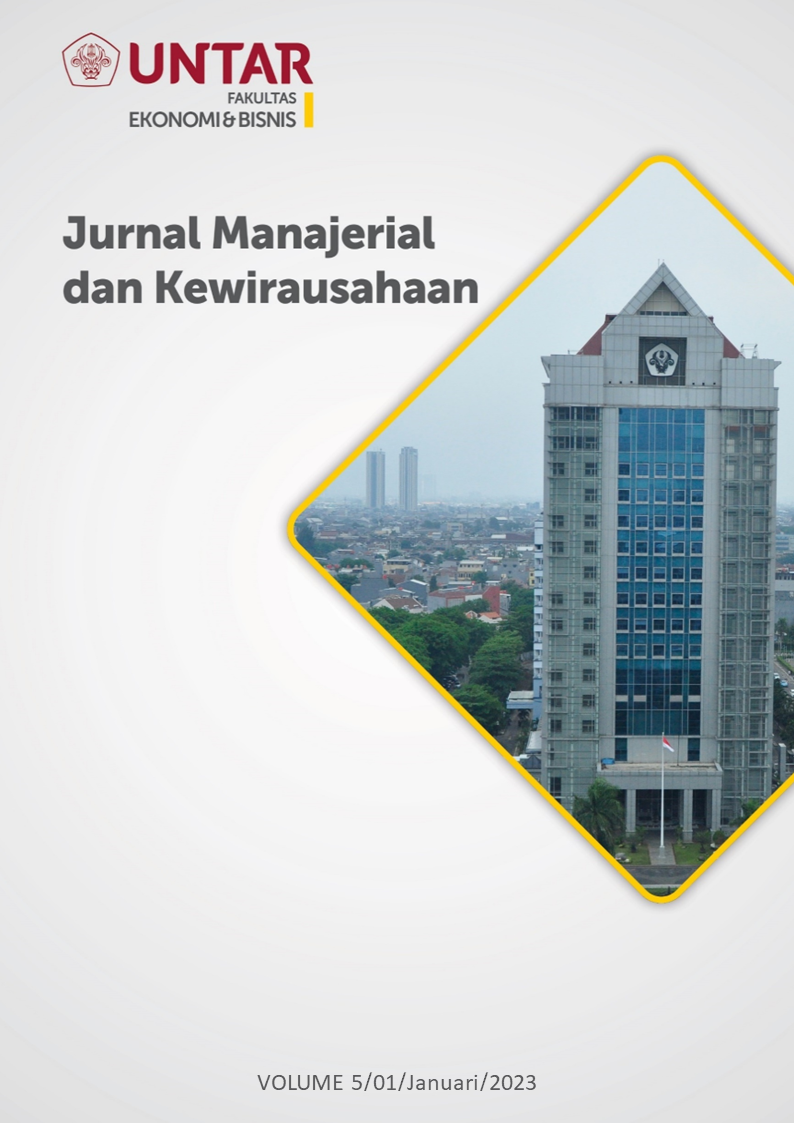Anteseden Perilaku Belanja Makanan Berlogo Halal pada Brand Sar
Main Article Content
Abstract
Logo halal menjadi salah satu faktor pertimbangan yang dilakukan oleh konsumen muslim dalam memilih makanan yang akan dikonsumsinya. Dengan adanya logo halal dalam kemasan makanan, akan berpengaruh terhadap behavior of halal labeled-food shopping Sari Roti di Jakarta. Tujuan penelitian ini adalah untuk menguji pengaruh spirituality, subjective norm, image, trust dan intention terhadap behavior of halal labeled-food shopping Sari Roti di Jakarta. Sampel dipilih sebanyak 220 responden konsumen Sari Roti di Jakarta. Pengolahan data dalam penelitian ini menggunakan program Smart-PLS 3.2.9. Hasilnya menunjukan bahwa subjective norm, image dan intention memiliki pengaruh yang positif dan signifikan terhadap behavior of halal labeled-food shopping Sari Roti di Jakarta. Sedangkan spirituality dan trust tidak memiliki pengaruh yang signifikan terhadap behavior of halal labeled-food shopping konsumen Sari Roti di Jakarta.
The halal logo is one of the consideration factors made by muslim consumers in choosing the food they will consume. With the halal logo in the food packaging, will affect the behavior of halal labeled-food shopping Sari Roti in Jakarta. The purpose of this research is to test the influence of spirituality, subjective norm, image, trust and intention towards behavior of halal labeled-food shopping Sari Roti in Jakarta. The sample was selected by 220 respondents of Sari Roti consumers in Jakarta. Data processing in this research used the Smart-PLS 3.2.9 program. The results show that subjective norms, image and intention have a positive and significant influence on the behavior of halal labeled-food shopping Sari Roti in Jakarta. Meanwhile, spirituality and trust does not have a significant influence on the behavior of halal labeled-food shopping of Sari Roti consumers in Jakarta.
Article Details
Section

This work is licensed under a Creative Commons Attribution-NonCommercial-ShareAlike 4.0 International License.
This work is licensed under a Jurnal Muara Ilmu Ekonomi dan Bisnis Creative Commons Attribution-ShareAlike 4.0 International License.,/p>
References
Aaker, J. L. (1997). Dimensions of brand personality. Journal of Marketing Research, Vol. 34(3), 347-356.
Ajzen, I. (1991), “The theory of planned behavior”, Organisational Behaviour and Human Decision Processes, Vol. 50, pp. 179-211.
Akroush, M. N., Jraisat, L. E., Kurdieh, D. J., AL-Faouri, R. N. & Qatu, L. T. (2016). Tourism service quality and destination loyalty – the mediating role of destination image from international tourists’ perspectives. Tourism Review, 71(1), 18–44. https://doi.org/10.1108/TR-11-2014-0057
Ayoun, B., Rowe, L. & Yassine, F. (2015), "Is workplace spirituality associated with business ethics?", International Journal of Contemporary Hospitality Management, Vol. 27 No. 5, pp. 938-957. https://doi.org/10.11ma08/IJCHM-01-2014-0018
Azam, A. (2016). An empirical study on non-Muslim’s packaged halal food manufacturers: Saudi Arabian consumers’ purchase intention. Journal of Islamic Marketing, 7(4), 441–460. https://doi.org/10.1108/JIMA-12-2014-0084
Bashir, A. M. (2019), "Effect of halal awareness, halal logo and attitude on foreign consumers’ purchase intention", British Food Journal, Vol. 121 No. 9, pp. 1998-2015. https://doi.org/10.1108/BFJ-01-2019-0011
Belwalkar, S., Vohra, V. & Pandey, A. (2018). The relationship between workplace spirituality, job satisfaction and organizational citizenship behaviors – an empirical study. Social Responsibility Journal, 14(2), 410–430. https://doi.org/10.1108/SRJ-05-2016-0096
Elseidi, R. I. (2018). Determinants of halal purchasing intentions: evidences from UK. Journal of Islamic Marketing, 9(1), 167–190. https://doi.org/10.1108/JIMA-02-2016-0013
Farah, M. F. (2021). Consumer perception of Halal products: An empirical assessment among Sunni versus Shiite Muslim consumers. Journal of Islamic Marketing, 12(2), 280–301. https://doi.org/10.1108/JIMA-09-2019-0191
Firdaus, F. S., Ikhsan, R. B. & Fernando, Y. (2022). Predicting purchase behaviour of Indonesian and French Muslim consumers: insights from a multi-group analysis. Journal of Islamic Marketing. https://doi.org/10.1108/JIMA-05-2021-0169
Ghozali, I. (2016). Aplikasi Analisis Multivariate dengan Program Spss 23. Semarang: Badan Penerbit Universitas Diponegoro.
Hair, Joseph, E., Jr et al. (2014). A Primer on Partial Least Squares Structural Equation Modeeling (PLS-SEM). SAGE Publications, Inc. California. USA.
Huang, C.-C. (2017), "The impacts of brand experiences on brand loyalty: mediators of brand love and trust", Management Decision, Vol. 55 No. 5, pp. 915-934. https://doi.org/10.1108/MD-10-2015-0465
Kloutsiniotis, P. V. & Mihail, D. M. (2018). The link between perceived high-performance work practices, employee attitudes and service quality: The mediating and moderating role of trust. Employee Relations, 40(5), 801–821. https://doi.org/10.1108/ER-08-2017-0201
Martins, V.W.B., Anholon, R., Quelhas, O.L.G. & Leal Filho, W. (2022), "Roadmap to enhance the insertion of social sustainability in logistics systems", International Journal of Productivity and Performance Management, Vol. ahead-of-print No. ahead-of-print. https://doi.org/10.1108/IJPPM-03-2022-0132
Mohd Suki, N. & Abang Salleh, A. S. (2016). Does Halal image strengthen consumer intention to patronize Halal stores?: Some insights from Malaysia. Journal of Islamic Marketing, 7(1), 120–132. https://doi.org/10.1108/JIMA-12-2014-0079
Muflih, M. & Juliana, J. (2021). Halal-labeled food shopping behavior: the role of spirituality, image, trust, and satisfaction. Journal of Islamic Marketing, 12(8), 1603–1618. https://doi.org/10.1108/JIMA-10-2019-0200
Muhamad, N., Leong, V. S. & Md Isa, N. (2017). Does the country of origin of a halal logo matter? The case of packaged food purchases. Review of International Business and Strategy, 27(4), 484–500. https://doi.org/10.1108/RIBS-06-2017-0049
Rodriguez-Rad, C.J. & Ramos-Hidalgo, E. (2018), "Spirituality, consumer ethics, and sustainability: the mediating role of moral identity", Journal of Consumer Marketing, Vol. 35 No. 1, pp. 51-63. https://doi.org/10.1108/JCM-12-2016-2035
Sekaran, U. & Bougie, R J. (2016). Research Methods For Business: A Skill Building Approach Seventh Edition (United Kingdom: John Wiley & Sons Ltd)
Shah Alam, S., Mohd, R. & Hisham, B. (2011), "Is religiosity an important determinant on Muslim consumer behaviour in Malaysia?", Journal of Islamic Marketing, Vol. 2 No. 1, pp. 83-96. https://doi.org/10.1108/17590831111115268
Tamindael, M. & Ruslim, T. S. (2021). Pengaruh Komunikasi dan Citra Merek terhadap Loyalitas Merek dengan Kepercayaan sebagai Mediasi. Jurnal Manajerial dan Kewirausahaan, 3(1), 236-244. https://doi.org/10.24912/jmk.v3i1.11317
Yohanna, & Ruslim, T. S. (2021). Pengaruh Brand Love, Brand Satisfaction, Brand Trust Terhadap Purchase Intention Produk Gucci. Jurnal Manajerial dan Kewirausahaan, 3(2), 569-579. https://doi.org/10.24912/jmk.v3i2.11903

